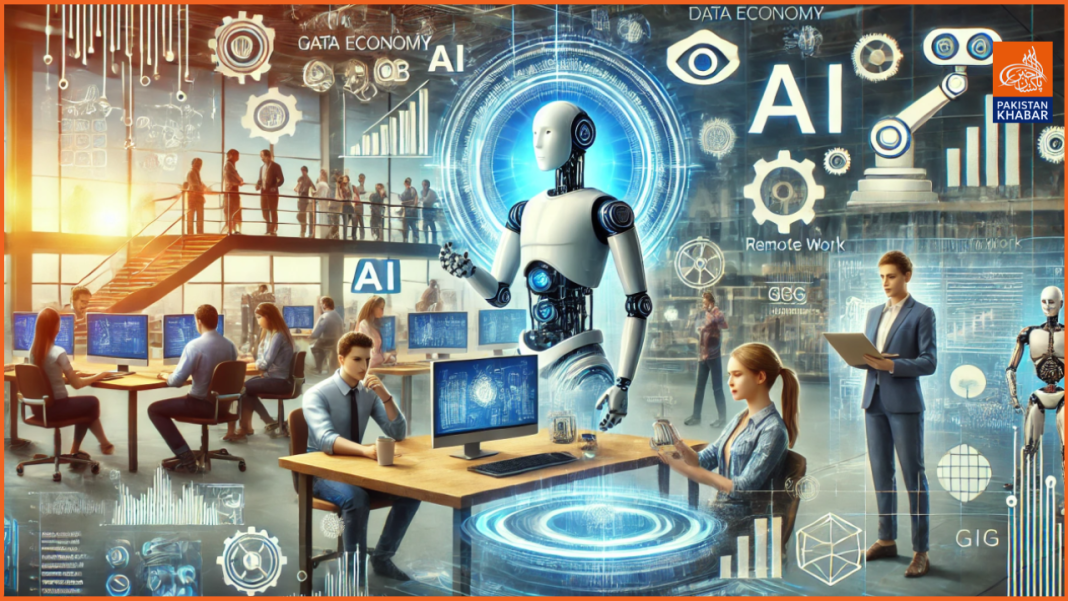As we progress through 2025, Pakistan stands at a pivotal juncture in its economic development, driven by the rapid integration of Artificial Intelligence (AI) across various sectors. This technological evolution presents a dual-edged sword: while AI offers avenues for innovation and efficiency, it also poses challenges to the traditional employment landscape.
Government Initiatives and Educational Advancements
Recognizing the transformative potential of AI, the Pakistani government has embarked on ambitious initiatives to cultivate a skilled workforce. The Ministry of Information Technology & Telecommunication (MoIT&T) has announced plans to train 100,000 AI graduates over the next five years in collaboration with academia, with an additional 50,000 to be trained with support from the IT industry. This strategy aims to prepare the nation for the evolving demands of the global AI market, projected to reach $1 trillion by 2030.
In tandem with government efforts, over 50 universities and institutes across Pakistan now offer AI and data science programs. This educational infrastructure is steadily producing qualified professionals equipped to navigate and contribute to an AI-driven economy.
Sectoral Transformations and Emerging Opportunities
The influence of AI permeates multiple industries within Pakistan:
- Manufacturing: Sectors such as textiles and cement are leveraging AI to enhance efficiency, reduce costs, and improve product quality. These advancements are essential for maintaining competitiveness in global markets and addressing international supply chain challenges.
- Healthcare: AI applications in predictive analytics, personalized medicine, and telemedicine are poised to revolutionize healthcare delivery, offering more accurate diagnostics and tailored treatment plans.
- Agriculture: The adoption of AI-powered tools for crop monitoring, pest detection, and yield prediction is set to enhance efficiency and sustainability in agriculture, a cornerstone of Pakistan’s economy.
- Finance: AI applications in fraud detection, risk management, and customer service automation are redefining the financial sector, leading to more secure and efficient operations.
The startup ecosystem in Pakistan reflects this AI-driven transformation, with over 200 AI-focused startups developing solutions across healthcare, finance, agriculture, and education.
Employment Dynamics: Challenges and Prospects
The integration of AI brings both challenges and opportunities to the job market:
- Job Displacement: Automation threatens roles in manufacturing, retail, and agriculture. For instance, the World Economic Forum predicts that automation and AI might replace almost 85 million jobs worldwide by 2025.
In Pakistan, industries heavily reliant on manual labor could face significant disruptions.
- Job Creation: Conversely, the same WEF report estimates the creation of around 97 million new positions in the labor market due to AI advancements.
In Pakistan, there is a growing demand for AI specialists, including data scientists, machine learning engineers, and AI researchers. The freelancing sector is also experiencing a boom, with Pakistani freelancers leveraging AI skills to secure international projects, thereby boosting the country’s gig economy.
Strategic Imperatives for a Balanced Transition
To harness AI’s potential while mitigating its challenges, Pakistan must adopt a multifaceted approach:
- Investment in Education: Strengthening educational programs to equip students with AI and data science knowledge is crucial for building a skilled workforce.
- Corporate Training: Companies should proactively train employees to adapt to AI tools and workflows, ensuring a smooth transition and minimizing job displacement.
- Public-Private Collaboration: Joint efforts between the government and private sector can drive research, innovation, and accessibility to AI technologies, fostering an environment conducive to growth and adaptation.
As Pakistan navigates the complexities of the AI revolution, a balanced strategy emphasizing education, innovation, and collaboration will be essential to ensure that the benefits of AI are widely shared, and the challenges are effectively managed.




